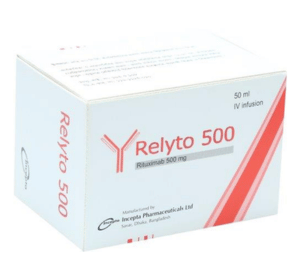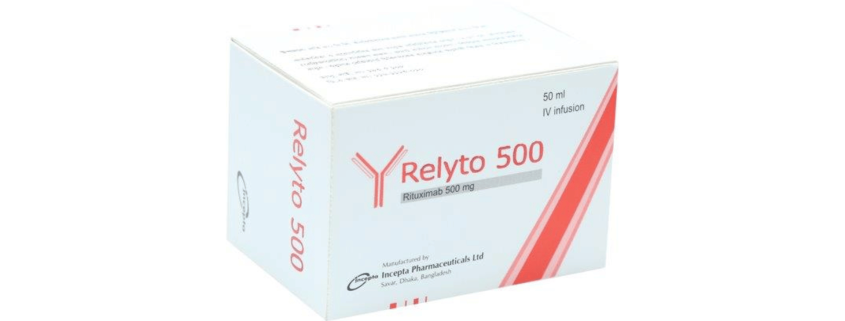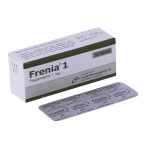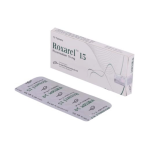Relyto(Rituximab)

Therapeutic Group: Monoclonal Antibody
Presentation
Relyto 100: Each 10 ml solution for infusion contains Rituximab 100 mg.
Relyto 500: Each 50 ml solution for infusion contains Rituximab 500 mg.
Description
Rituximab is a genetically engineered chimeric murine/human monoclonal IgG1 kappa antibody directed against the CD20 antigen. Rituximab has an approximate molecular weight of 145 kD. Rituximab has a binding affinity for the CD20 antigen of approximately 8.0 nM.
Indications
Rituximab is a CD20-directed cytolytic antibody indicated for the treatment of patients with:
– Non-Hodgkin’s Lymphoma (NHL)
– Chronic Lymphocytic Leukemia (CLL)
– Rheumatoid Arthritis (RA) in combination with methotrexate in adult patients with moderately-to severely-active RA who have inadequate response to one or more TNF antagonist therapies
Granulomatosis with Polyangiitis (GPA) (Wegener’s Granulomatosis) and Microscopic Polyangiitis MPA) in adult patients in combination with glucocorticoids
Limitations of Use: Rituximab is not recommended for use in patients with severe, active infections
Dosage & Administration
Rituximab should be administered only as an intravenous infusion
– It should not be administer as an intravenous push or bolus
– Rituximab should only be administered by a healthcare professional with appropriate medical support to manage severe infusion reactions that can be fatal if they occur
– The dose for NHL is 375 mg/m2
– The dose for CLL is 375 mg/m2 in the first cycle and 500 mg/m2 in cycles 2-6, in combination with FC, administered every 28 days
– The dose as a component of Ibritumomab tiuxetan therapeutic regimen is 250 mg/m2
– The dose for RA in combination with methotrexate is two-1000 mg intravenous infusions separated by 2 weeks (one course) every 24 weeks or based on clinical evaluation, but not sooner than every 16 weeks. Methylprednisolone 100 mg intravenous or equivalent glucocorticoid is recommended 30 minutes prior to each infusion.
– The dose for GPA and MPA in combination with glucocorticoids is 375 mg/m2once weekly for 4 weeks.
Side Effects
Most common adverse reactions in clinical trials were:
NHL (≥ 25%): Infusion reactions, fever, lymphopenia, chills, infection and asthenia
CLL (≥ 25%): Infusion reactions and neutropenia
RA (≥ 10%): Upper respiratory tract infection, nasopharyngitis, urinary tract infection, and bronchitis (other important adverse reactions include infusion reactions, serious infections, and cardiovascular events)
GPA and MPA (≥15 %): Infections, nausea, diarrhea, headache, muscle spasms, anemia, peripheral edema (other important adverse reactions include infusion reactions)
Precautions
Tumor lysis syndrome: Aggressive intravenous hydration, anti-hyperuricemic agents should be administered and renal function should be monitored
Infections: Rituximab should be withheld and appropriate anti-infective therapy should be instituted Cardiac arrhythmias and angina: Infusions should be discontinued in case of serious or life-threatening events
Bowel obstruction and perforation: Abdominal pain, vomiting, or related symptoms should be considered and evaluated for
Live virus vaccines: Live virus vaccines should not be administered prior to or during Rituximab
Cytopenias: Blood counts should be monitored at regular intervals
Use in Pregnancy & Lactation
Pregnancy Category C
There are no adequate and well-controlled studies of Rituximab in pregnant women. Women of childbearing potential should use effective contraception while receiving Rituximab and for 12 months following treatment. Rituximab should be used during pregnancy only if the potential benefit justifies the potential risk to the fetus.
Lactation
It is not known whether Rituximab is excreted in human milk. Published data suggest that antibodies in breast milk do not enter the neonatal and infant circulations in substantial amounts.
The unknown risks to the infant from oral ingestion of Rituximab should be weighed against the known benefits of breastfeeding.
Pediatric Use
Safety and effectiveness of Rituximab have not been established in pediatric patients.
Drug Interaction
Renal toxicity when used in combination with Cisplatin.
Commercial Pack
Relyto 100: Each box contains 1 vial of 10 ml sterile solution of Rituximab 100 mg for infusion.
Relyto 500: Each box contains 1 vial of 50 ml sterile solution of Rituximab 500 mg for infusion.
Others
Instruction of Uses
Appropriate aseptic technique should be used. Parenteral drug products should be inspected visually for particulate matter and discoloration prior to administration. The vial should not be used if particulates or discoloration is present. Necessary amount of Rituximab should be withdrawn from vial and diluted to a final concentration of 1 mg/mL to 4 mg/mL in an infusion bag containing either 0.9% Sodium Chloride, USP, or 5% Dextrose in Water, USP. The bag should be gently inverted to mix the solution. Should not be mixed or diluted with other drugs. Any unused portion left in the vial should be discarded.
Rituximab solutions for infusion may be stored at 2Ëš to 8Ëš C for 24 hours. Rituximab solutions for infusion have been shown to be stable for an additional 24 hours at room temperature.
However, since Rituximab solutions do not contain a preservative, diluted solutions should be stored refrigerated (2Ëš to 8Ëš C). No incompatibilities between Rituximab and polyvinylchloride or polyethylene bags have been observed.



